UE’s First Virtual Convention Shows Leadership in Tough Times
Although they were unable to gather in person due to the COVID-19 pandemic, over 100 delegates from UE locals across the U.S. nonetheless held a successful virtual convention from September 20-24, with all of the inspiration, education, democracy and solidarity of a regular UE convention. They were joined by dozens of guests, including rank-and-file members, new UE members from recent organizing campaigns, retired UE officers and staff, and guests from allied unions Unifor (Canada) and the FAT (Mexico).
As UE General President Carl Rosen noted as he opened the convention, a virtual meeting was not the UE leadership’s first choice, and as COVID-19 vaccines became available in the spring and cases in the U.S. began to drop, the union’s General Executive Board made plans for an in-person convention in Pittsburgh. However, with the spread of the Delta variant pushing cases up again in late summer, they made the difficult decision to hold the convention online.
At the conclusion of the week, Rosen deemed the virtual meeting a success, thanking the delegates “for a tremendously productive convention. We had the kind of democratic debates over policy and direction that are necessary to be a real rank-and-file union.”
“I really want to commend all of you for your great participation in this Convention,” added Director of Organization Gene Elk, “and making this convention such a wonderful success under trying circumstances. You guys just rocked at this convention and inspired me, and I hope inspired yourselves.”
Since the number of delegates would have made a regular Zoom meeting unwieldy, the main convention sessions were held as a Zoom webinar, with only the current speaker, members of committees making reports, and the national officers on the screen. However, in an effort to make the event as participatory as possible and help delegates see who else was “in the room,” different geographical groups of members were brought up “on stage” at the beginning of each morning and several afternoon sessions, giving them an opportunity to wave to other delegates and participate in a “Who are we? UE!” chant.
“Leading our members and the broader working class through tough times”
The convention opened at 11am Eastern on Monday morning — one of the challenges of holding the convention online was accommodating the fact that UE’s membership spans all four continental U.S. time zones (delegates from California, which boasts more UE members than any other state, were starting at eight in the morning).
Pastor Erin Jones, of the Hot Metal Bridge Faith Community on Pittsburgh’s South Side, gave the invocation. Echoing the convention’s theme of “Leading Through Tough Times,” Jones said of the past year, “It's really hard to know what to do with such heaviness and devastation and grief.” But, she said, “I put my hope in a God of solidarity, who doesn't run away from the hard times, who certainly doesn't cause them to teach some sadistic cosmic lesson, but rather a God who mourns and grieves with us and then empowers us to walk into the future.”
“Holy One,” she asked, “bless this convention as they work to find the path to walk boldly together into an uncertain and tough future.”
Delegates were welcomed by State Representative Ed Gainey, who won the Democratic primary for mayor of Pittsburgh in May, unseating the incumbent Bill Peduto. (UPDATE, 11/6/21: Gainey won the general election in November and in January 2022 will become the first Black mayor in this majority white city.) Gainey made taking on the powerful healthcare conglomerate UPMC the center of his campaign, drawing support from UE Local 667. In his remarks, Gainey thanked UE for the support he received in the primary, and “for all the work that you do for all workers.”
“The stronger the union, the stronger the nation, the stronger we are together. And when we're strong together we can ensure that we get good paying jobs for people, that people will be working in safe environments, and that starts with you.”
John Miles, Local 506, and Delores Phillips, Local 1118, were appointed Sergeants-at-Arms.
In his President’s address, Rosen told delegates, “As we come together today, virtually, we do indeed face tough times, both for workers in general and for our union in particular. The COVID-19 pandemic, of course, has taken a personal toll on many of us. But it has also exposed in a raw form many of the ways that the capitalist system regularly inflicts a personal toll on members of the working class.” From the ending of expanded unemployment benefits and the eviction moratorium to the ravages of climate change and threats to voting rights, Rosen detailed the ways in which corporate domination of society makes tough times even tougher for the working class.
“Fortunately,” he continued, “you have a union that isn’t taking this abuse sitting down. We have solutions and we are fighting for them. That’s the part about leading.”
He reviewed how UE locals have won pandemic protections and benefits, and significant contract gains, through aggressive struggle, along with UE gains in organizing and first contracts. Despite the pandemic limiting travel and in-person meetings, UE has held fast to its principle of rank and file control — “this very convention,” he said, “being held virtually but in a manner intended to maximize full democratic control by the elected delegates ... is a testament to our leadership on rank-and-file control, especially at a time when many unions have used the pandemic as an excuse to run their conventions as online spectacles with little or no delegate participation in decision-making.”
Rosen also spoke about UE’s work over the past two years pursuing independent political action, international solidarity, and uniting all workers — which, together with aggressive struggle and rank and file control, make up the five core principles that UE outlined in the booklet Them and Us Unionism in 2020.
“That’s what ‘them and us unionism’ means to us as we give leadership during tough times. The only way to challenge the balance of power in this country is to organize the working class to rise up.
“So yes, we are living in tough times for working people, but we are also leading our members and the broader working class through those times, with a vision and a plan that will bring better days ahead, days where workers will win more of the justice that they deserve.”
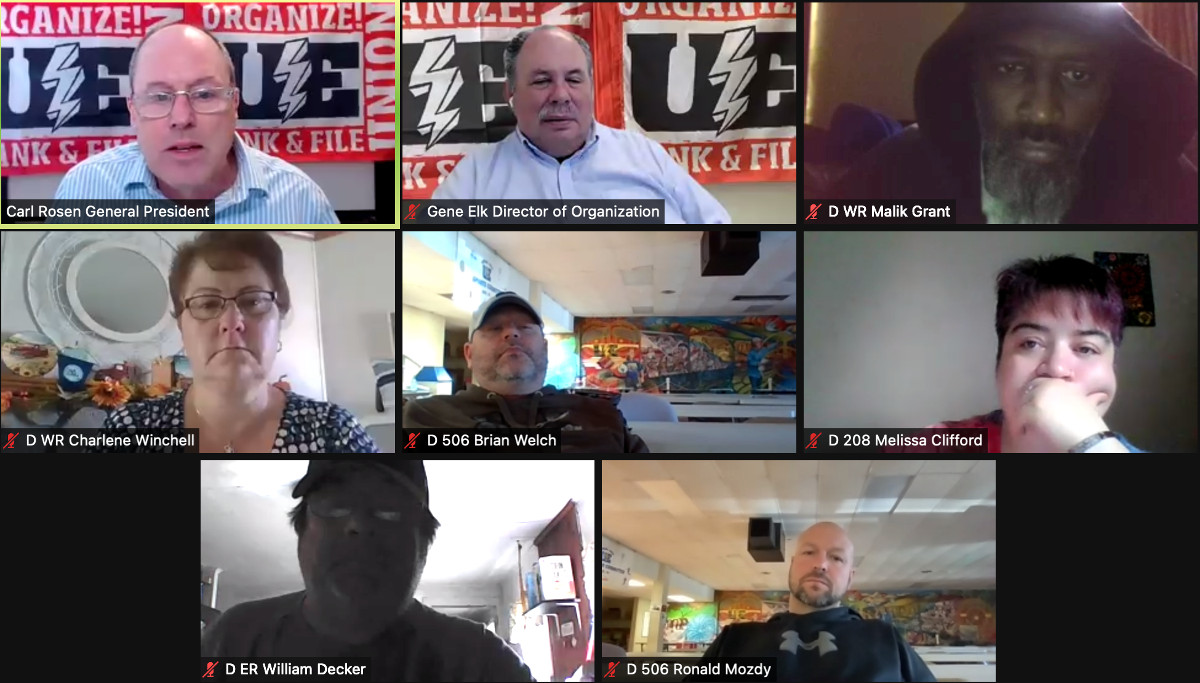
The Education Committee gave their report to the full convention on Friday morning.
Following the morning session, delegates headed to separate Zoom meetings for the various committees of the convention: Resolutions, Constitution, Organizing, Publicity and Education, and the Policy Action Committee, which takes selected UE policy resolutions and develops an action plan for the union for the next two years. This year, the Policy Action Committee discussed Medicare for All, the importance of fighting for voting rights, and UE’s new Leadership and Staff Development Program, which is aimed at developing the leadership skills of UE members from racial and ethnic backgrounds which are currently underrepresented in UE leadership or on the UE staff.
New Director of Organization
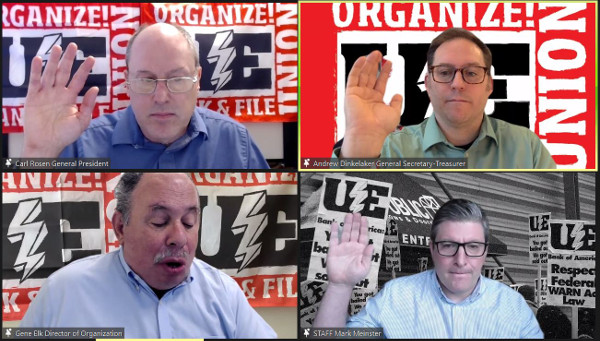
Retiring Director of Organization Gene Elk (bottom left) swearing in UE officers, clockwise from top left: President Carl Rosen, Secretary-Treasurer Andrew Dinkelaker, Director of Organization Mark Meinster.
Delegates elected International Representative Mark Meinster to succeed Director of Organization Gene Elk, who is retiring at the end of his term [1]. Addressing the convention following his election, Meinster emphasized his intention to work with International Representative Greg Cross (who also ran for the position) and those who supported him. “There are different viewpoints in this union on important issues and, brothers and sisters, that is a good thing, we should not shy away from that,” he said. “We need more open and respectful debate, not less. That's how we get stronger.”
“Because we all know that at the end of the day,” Meinster continued, “we are union brothers and sisters and as the history of this union shows, we can never allow ourselves to be divided.”
Meinster noted that with his election, all three officer positions continue to be held by white men. “Brothers and sisters, let's change that,” he said. “Let's work now to ensure that our leadership at all levels of this Union reflects our membership. That is more important today than it's ever been so I thank the membership for this incredible honor and I look forward to standing with you as we work together to build this great union.”
Industrial Caucuses Bring Locals Together
Over the last several conventions, UE members from Hallcon and Service Contract Act locals have used the opportunity to meet and share experiences after the main sessions or during breaks. At this year’s convention, space was officially made in the schedule for all locals to join “industrial caucuses” — groups of locals who represent workers in the same industry. In addition to rail crew drivers and Service Contract Act workers, caucuses were held of co-op workers, manufacturing workers, health and social service workers, public-sector workers and higher-ed workers.
Asked to comment on the industrial caucuses in the Zoom chat the next morning, delegates were positive about the experience. Ezekiel Harouff, Local 123, wrote that the manufacturing caucus helped him realize that “We're definitely not alone in problems. We are ALL in this together!!” David Droster, Local 1186, reported that the co-op worker caucus also showed “just quite how similar our experience has been.” Leslie Riddle, Local 170, added that in the public sector caucus she learned “that we all have some major struggles. But we have amazing people that can overcome these struggles and keep building this union.”
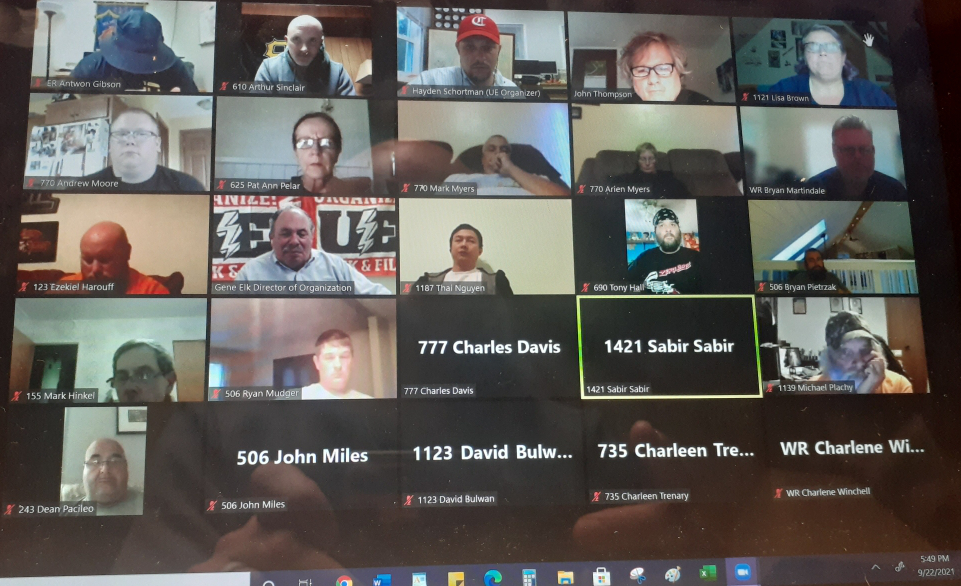
Members of the manufacturing caucus.
Women’s Caucus Focuses on Education
On Sunday before the Convention officially opened, about two dozen UE members met as part of the Women’s Caucus. Leslie Riddle, Local 170 and GEB member, chaired the meeting.
Caucus leaders shared details about the Florence Criley Women’s Leadership Fundraiser [2], which will feature Larsene Taylor as the guest speaker on October 10. Taylor is a past president of UE Local 150, a former GEB member, and still a community activist. Marie Lausch, Local 222, and several other members spoke admiringly of Larsene and her work and expressed their excitement about the event.
The money raised during this event will help send UE members to the various union women leadership training opportunities held around the country each year. Several UE members attended the 2021 Polk School for Women Workers, held virtually this year. They shared with the caucus some of the things they learned there.
Brookli Potts, Local 119, attended the Polk School and learned a lot about labor history in Chicago, where the program is based. She remarked that the struggles at Haymarket Square which led to conflict between workers and police there were impressive. "Those leaders were fighting to work only eight hours a day, and to also have eight hours for rest, and eight for other things. I wished they had called for only six hours of work instead of eight!" Thayer Reed, Local 1186, Melissa Pelkey, Local 255, and Charlene Winchell, Western Region President, also attended the Polk School and reported on their experiences.
Caucus members also reviewed the resolution submitted to the Convention by Local 228, “The Battle for Equal Women’s Rights,” making plans to speak to the resolution and highlight aspects of it that were important to them.
Members then discussed some of the work they hope the caucus can accomplish in the coming year, which will focus on educational programs for members.
African-American Black Caucus Strengthened by Convention Meet
The African-American Black Caucus also met on Sunday before the convention officially opened, following a series of previous meetings held with a broad group of Black rank-and-file members from locals across the union.
Angaza Laughinghouse, Local 150, told the UE NEWS following the convention that the caucus has existed “ever since I’ve been a member of UE in the late 1990's and 2000's — always initiated by rank-and-file African-American members and not staff or our national leaders,” but that with this year’s series of meetings leading up to the Convention caucus members are “revitalizing it and strengthening it so that we can continue to make our important and needed contributions to the national union, our locals and our communities.”
One of the caucus’s main priorities is building the leadership capacity of Black UE members, not just in their locals but in the regions, the national union and their own neighborhoods and Black communities. Caucus members also discussed how Black trade unionists, many of whom live in primarily African-American communities, have important roles to play in bringing a working-class perspective to the issues faced by their communities. Those issues include police misconduct and brutality and attacks on “critical race theory” (which are really an effort to take Black history out of schools), gentrification and voting rights. Organizing more unions in the right to work South (where 58 percent of all Black people live), winning collective bargaining rights, and women’s and gender rights are all also important issues to the caucus.
The caucus also plans to reach out to Black union caucuses and majority Black-led unions to learn and share, including the Teamsters Black Caucus, International Longshoremen’s Association Local 1422 in Charleston, SC, International Longshore & Warehouse Union Local 10 in Oakland, CA, and others.
Laughinghouse emphasized that the African-American Black Caucus is a self-determining and self-reliant body of rank-and-file members, which has democratically selected its own coordinating committee. The caucus plans to meet again in October.
Rank-and-File Democracy in Action
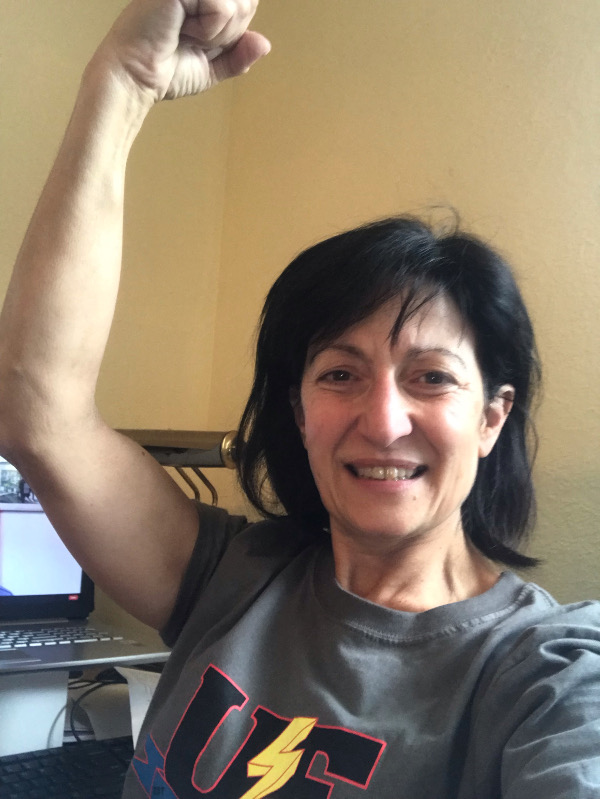
Karen Rizzo, Local 613.
Following Secretary-Treasurer Andrew Dinkelaker’s financial report, and during debate over a constitutional amendment about per capita, delegates held a robust discussion of the union’s finances. As the convention prepared to vote to accept the financial report, Karen Rizzo, Local 613, rose to say “I have to say I am proud and impressed to be a part of a union that is able to discuss the difficult discussions openly and honestly and objectively.
“I've been on the GEB [General Executive Board], I've been on the resolutions committee, I know that these things that you put together are not easy, not at all,” Rizzo continued, “and once you have hashed out everything and taken all the time to put into there, it can be discouraging to have somebody ask a question, but you’re all willing to answer, you’re all willing to speak. I also have been a person in the minority opinion and that makes it difficult to speak.
“I just have to say I'm proud to be a member of this union — that's it.”
In addition to constitutional amendments, delegates debated and passed the 25 resolutions that will make up UE policy for the next two years. (UE Policy for 2021-23 is available on the UE website at ueunion.org/ue-policy [3].)
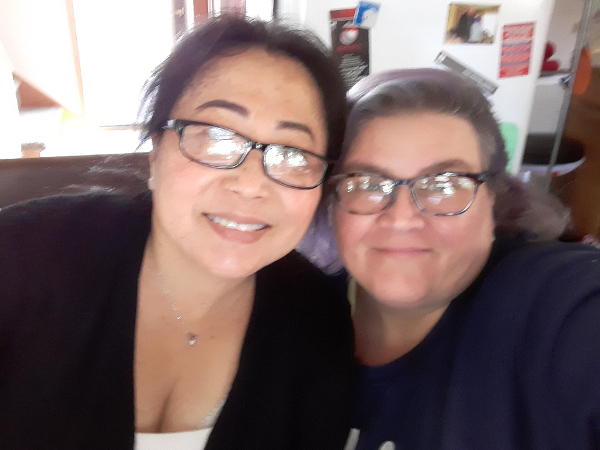
Local 1121 President Lisa Brown (right) with Local 1121 delegate Vicky Yang.
Local 1121 President Lisa Brown, talking about her experience as a first-time convention delegate, observed that with “all of these [resolutions] that we've discussed throughout the convention … we're helping take care of each other. That seems to be just the core of this union.”
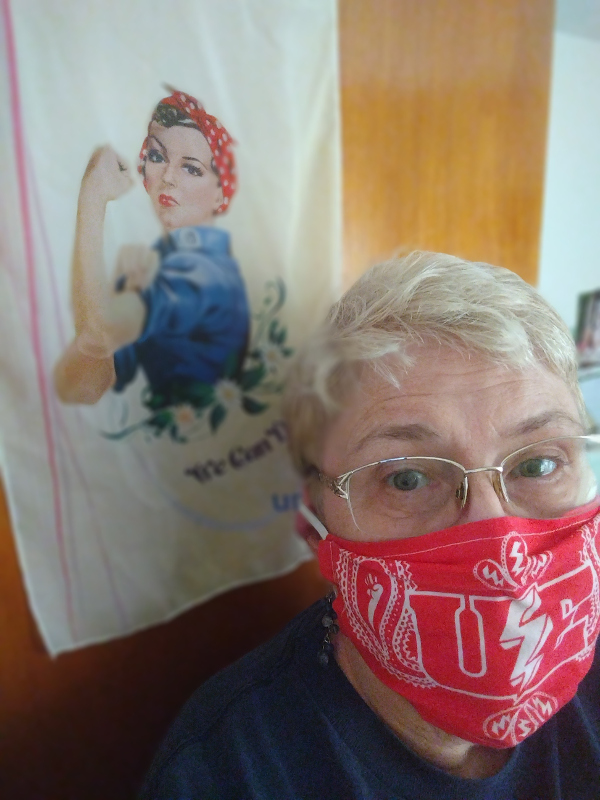
Marie Lausch, Local 222
“I urge all of you to take these resolutions back to your locals,” Marie Lausch, Local 222 told delegates on the final day of convention. “In six months, go back and take out a couple of resolutions and take a look at them and say, what are we doing about this? Let's take one point and take some action on it, on one of the resolutions. These aren't just old dead documents, these are the lifeblood of our union.”
In his final remarks, Secretary-Treasurer Dinkelaker expressed his “appreciation to all that were involved” in the convention, “even if you were a quiet observer on the side.”
“I certainly know that everyone has a contribution to make to this organization and a contribution to make to this world. And it's a matter of making sure that we give each other the room to shine and to support each other in our efforts to do that, so that we can continue to make this a better world.”
